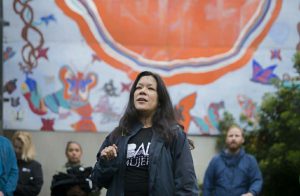Jacqueline Arellano: Dedicated to Helping Immigrants

With the increase of media attention on immigration and the border, stories of children being separated from their parents, inadequate detention conditions, and border deaths are causing outrage nationwide.
However, like most border residents, Jacqueline Arellano knows these issues are not new and her work has allowed her to help individuals affected by issues related to the border and immigration policy in numerous ways.
Arellano, water drop director for the nonprofit organization Border Angels, sees the topic of immigration as one that is very close to home.
A child of immigrants, Arellano became involved with Border Angels after learning of the influx of unaccompanied minors from Central America in 2014.
Arellano empathized with the situation because she knew the love her family had for her was no different than the love those parents had for their children, she said.
“I think it’s everyone’s responsibility – not just Latinos – but I think mainly for us it really hits home and we have a calling, if we feel it, to join organizations that do the work,” Arellano said.
Two years after Arellano began volunteering with Border Angels, she joined the water drop events where volunteers travel to high-traffic desert paths to leave gallons of water.
And although she was intimidated at first to get more involved within the organization, she saw the need for leaders and decided to raise her hand. Arellano became a water drop route leader and later the director.
“The need for not just volunteers but leadership has just continued to escalate, and I think all of us need to dig deep and be willing to get over that anxiety,” Arellano said.
As the director, Arellano manages correspondence with interested volunteers, events, helps coordinate water drop route leaders, and maintains records of the condition water gallons are found in during check-in hikes.
Raised in the very area where they leave water gallons, Imperial Valley, Arellano grew up in a home with immigrant parents and one sister.
In the small rural city of El Centro, Arellano said her experience was being the majority where everyone was Mexican and spoke Spanish, however, leaving her home for college showed her a different reality than what she knew.
Arellano left home to attend UC Irvine and it was there that her passion for advocacy grew.
“I started seeing how much our people work and how uneven it is and how disrespected the housekeepers were,” Arellano, who would ride the bus with housekeepers, speak to school cooks and gardeners, said. “I noticed how much the people around me just didn’t care and treated them like nothing and it really pissed me off.”
She decided to drop out of college and return home where she fell into a counseling career. Arellano has been a counselor for 10 years, and is currently a substance abuse counselor for a DUI program. And because she is bilingual, her cases have allowed her to work with the immigrant community, which with the current administration’s stance on immigration, has become smaller because of increased deportations.
“It’s really drastic the decrease in the amount of folks who are allowed to have minor slip-ups in this country, now they are just being detained,” Arellano said.
The stress of hearing the situations her clients were in began to take a toll on her personal health and after seeing several doctors she found acupuncture, which lead her to find a new way to help immigrants.
“I started seeing it’s not fair that our community is disproportionately damaging their bodies and there’s no resources for them especially if they don’t have documents,” Arellano said.
Because of the limited medical options for undocumented immigrants due to a lack of health insurance, social security number, and the ability to travel to Tijuana to see a doctor, she decided to do something more integrative to help individuals by using acupuncture.
She is currently attending Pacific College of Oriental Medicine in she hopes that she can open her own acupuncture clinic to help undocumented immigrants who have limited medical resources.






